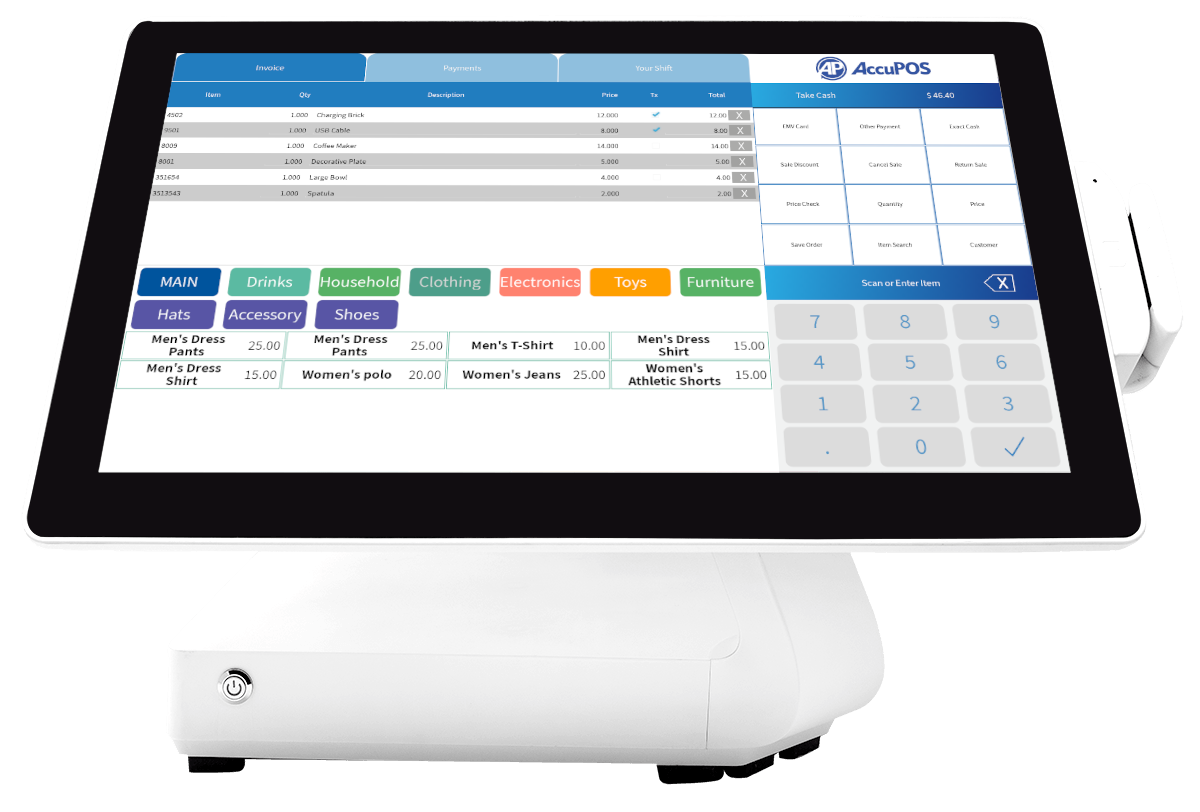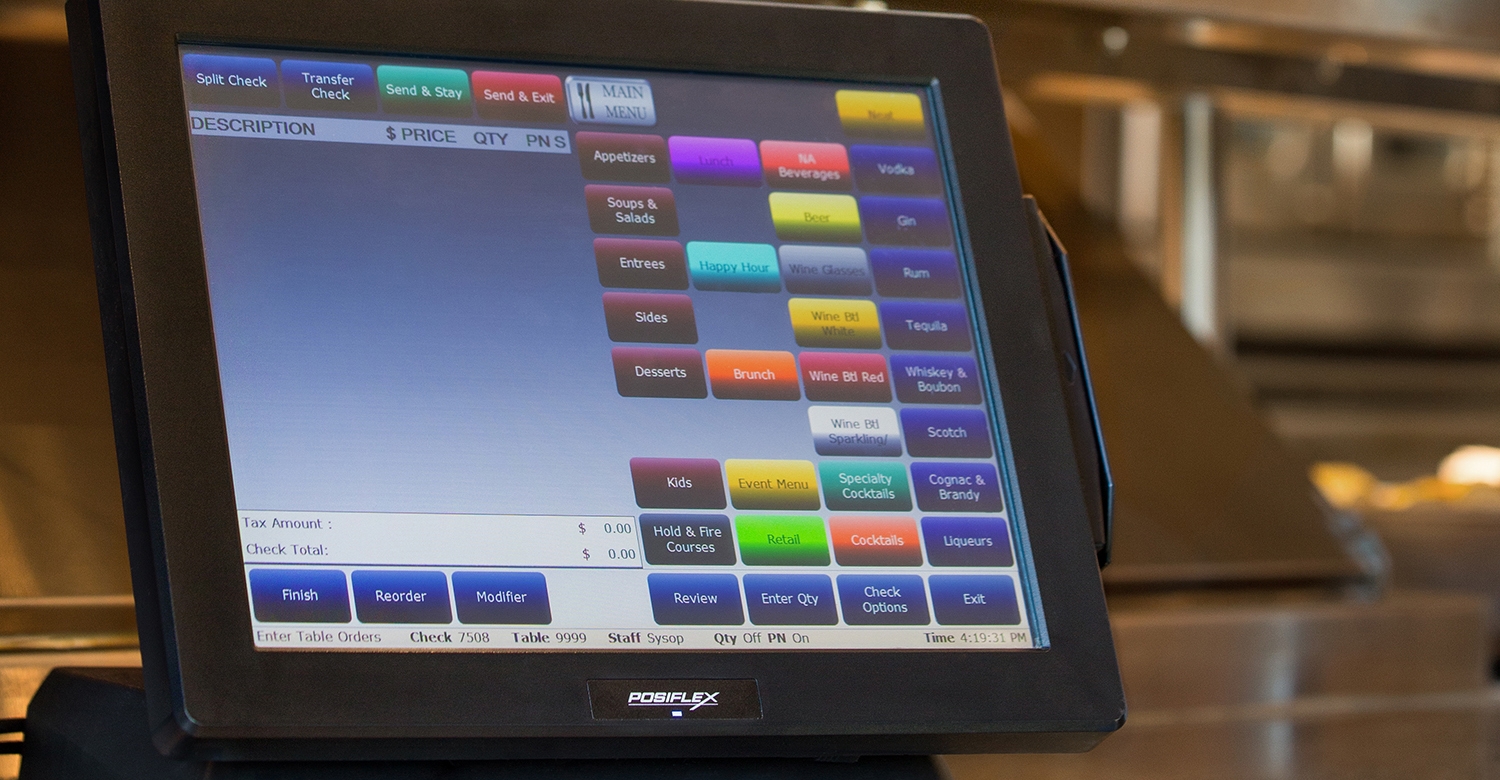Some Known Details About Pos
Some Known Details About Pos
Blog Article
Little Known Questions About Point Of Sale.

POS: Retail Point-Of-Sale Solutions Streamline Deals
Pos Things To Know Before You Get This

Hardware Components of a Point of Sale System What makes a POS system tick? It's not just software application; the hardware plays a starring function. Consider it as the body to the software application's brain. Without the ideal hardware, even the most sophisticated POS software is simply a quite face. Vital POS Hardware So, what are the must-haves? Let's break it down. The central processing unit, often a computer system or tablet, is the heart of the operation. The display or touchscreen show enables personnel to engage with the system. A barcode scanner accelerate the checkout procedure. Remember the days of by hand entering each code? The trusty receipt printer offers customers with a record of their purchase. A money drawer keeps your money safe and arranged. A card reader permits check here clients to pay with credit or debit cards. Diving Deeper: Beyond the Basics However wait, there's more! Depending on your service, you may need specific hardware. For example, a restaurant might incorporate kitchen area printers to relay orders, while a retailer may use label printers for item tagging. Ever wonder how your regional bakery quickly prints those delicious-looking labels? Choosing the Right Hardware: A Balancing Act Selecting the ideal hardware isn't almost purchasing the most pricey equipment. It has to do with finding the sweet spot between functionality, sturdiness, and spending plan. A small company just starting out may select a more fundamental setup, while a high-volume retailer will require robust, high-performance machines. Is it much better to buy brand-new or utilized? Consider your options carefully. A brand-new system uses the current technology and warranty protection, but a reconditioned system can conserve you money. The Future of POS Hardware What does the future hold? Anticipate to see even more combination with mobile phones, biometric scanners for staff member authentication, and advanced analytics dashboards showed on bigger, clearer screens. Imagine a world where inventory is instantly upgraded in real-time as products are scanned-- a world where you can track your very popular product from anywhere in the world. The possibilities are endless, and the hardware is continually progressing to fulfill the demands these days's companies. Are you ready to update your point of sale system?
Software Characteristics and Capabilities: The Heart of Your POS System
Ever watch an experienced barista move through a hectic early morning rush? Their trick isn't simply caffeine; it's a seamless dance with their POS system. The software is the conductor of your organization symphony, managing whatever from sales to stock. What notes should you be listening for? What abilities really matter in today's market?
Inventory Management: Beyond Counting Beans
Forget spreadsheets that haunt your dreams. Modern POS systems use real-time inventory tracking, notifying you when your stock of artisanal coffee beans dips precariously low. Believe of it as a digital guardian angel, preventing those awkward "Sorry, we're out!" moments to consumers. What if you could likewise forecast need based on historic information? Lots of systems now offer forecasting tools, an effective weapon versus overstocking and lost sales. This assists prevent the dilemma of running out of popular items or collecting excess stock of slow-moving products, both of which can constrain capital and space.
Sales Reporting and Analytics: Translating the Data
Sales information is the brand-new gold, and your POS system is the miner. Forget just understanding how much you offered today. Dive deep into the information to reveal trends, identify your best-selling products, and comprehend consumer habits. Which menu item pairs completely with the daily special? Which promo resonated most with your clients? These insights are not simply fascinating; they're actionable intelligence. Without reliable sales reporting, navigating the complexities of company decision-making becomes like sailing without a compass, increasing the possibility of missteps and missed chances.
Consumer Relationship Management (CRM): Structure Bridges, Not Walls
Keeping in mind a routine customer's name and favorite order is charming, however scaling that personal touch is difficult. POS systems with CRM abilities permit you to track client purchase history, preferences, and even birthdays. Picture immediately offering a discount rate on their birthday-- a small gesture that cultivates commitment and encourages repeat organization. However there is the possible snag of poor data quality, which can result in incorrect client profiles and ineffective marketing efforts.
Payment Processing: Streamlining the Deal
The checkout experience can make or break a sale. Smooth integration with different payment techniques-- credit cards, mobile wallets, even copyright-- is non-negotiable. Can your system deal with split payments? Does it offer safe and secure tokenization to secure customer data? A clunky payment process is like striking a sour note in your organization symphony, possibly interrupting the entire performance. Ensuring compatibility with developing payment innovations and adherence to security requirements are paramount for preserving customer trust and functional performance.
Worker Management: Keeping the Group in Sync
From clocking in and out to handling authorizations and tracking performance, employee management includes simplify operations and improve accountability. Is scheduling a nightmare? Numerous POS systems offer incorporated scheduling tools, optimizing staffing levels based upon predicted demand. A typical obstacle that is often ignored is the challenge of integrating staff member management functionalities with payroll systems, which can lead to errors and inadequacies in wage calculations.
Advanced Features: Leveling Up Your Operations
- Table Management: Suitable for restaurants, this feature allows you to visualize your dining-room, track table status, and handle reservations.
- Commitment Programs: Reward your best customers and encourage repeat company with incorporated loyalty programs.
- Online Ordering Combination: Perfectly incorporate your POS system with online buying platforms to expand your reach.
Selecting the ideal POS system is about more than just performance; it's about discovering a partner that can grow with your organization. Consider your existing needs, expect future development, and do not hesitate to ask the difficult questions. The right software can change your business from a disorderly cacophony into a harmonious masterpiece.
Industry-Specific POS System Applications
Consider the regional bakeshop, busy with morning consumers yearning fresh croissants. A generic POS system might manage deals, however can it handle complicated recipes, track ingredient inventory, or immediately change production schedules based upon sales data? Most likely not. That is where the beauty of industry-specific POS systems shines.
Dining establishments and Hospitality
For dynamic restaurants, speed and accuracy are critical. How many times have you seen servers juggling orders, adjustments, and splitting expenses, all while trying to supply outstanding service? A dining establishment POS system improves these processes, permitting table management, cooking area order tickets, and even online ordering combination. These systems frequently consist of functions like ingredient-level stock tracking, essential for handling food costs and decreasing waste. Ever question why your preferred meal is often unavailable? It may originate from a lack of appropriate stock management.
- Table Management
- Kitchen Area Order Tickets
- Online Purchasing Combination
- Ingredient-Level Inventory Tracking
Retail Solutions
Retail, with its diverse stock and client interactions, requires a various set of tools. Think of a shop clothing shop having a hard time to track sizes, colors, and seasonal collections using a fundamental checkout system. An industry-specific retail POS system uses features like barcode scanning, client commitment programs, and detailed sales reporting. These systems can even incorporate with e-commerce platforms, providing a seamless omnichannel experience for customers. Did you know some retail POS systems can predict future sales trends based upon historic information? Now that is effective!
The Perils of a Mismatch
Picking the wrong POS system can develop substantial functional hurdles. A clothes store using a dining establishment POS, for instance, would find it inappropriate for managing inventory with sizes and colors. The lack of appropriate reporting and analytics could lead to misinformed getting choices and lost earnings. The result might be similar to attempting to fit a square peg in a round hole.
Secret Considerations
Selecting an industry-specific POS system requires cautious assessment. Think of your organization's special requirements and functional workflows. Does the system incorporate with existing software application? Does it offer the required reporting capabilities? Is it scalable to accommodate future development? A well-chosen POS system is not simply a transaction tool; it's a strategic property that can drive efficiency, enhance customer satisfaction, and ultimately, increase your bottom line. Remember, it is an investment in your organization's future, not just a cost.
Security Factors To Consider for Point of Sale Systems
Ever heard the tale of the mom-and-pop store that lost everything due to the fact that of a single, neglected security defect in their POS system!.?. !? It's a cautionary tale, and it highlights a crucial element typically eclipsed by the appeal of elegant features and structured operations. The reality is, a POS system is just as excellent as its security. What great is a system that crunches numbers in a flash if it permits criminals to swipe customer's information just as rapidly?
The Vulnerability Minefield
The digital landscape is a battlefield. Every POS system, no matter size or elegance, is a potential target. Are you genuinely got ready for the hazards lurking around the corner? The real pinch comes when you discover that your outdated software application has an open hole that hackers can make use of, turning your business into an unwitting accomplice in identity theft. The trouble is that hackers are crafty and are constantly altering their techniques.
Common Security Gaps and Expert Tips
- Weak Passwords: "Password123" isn't sufficing. Use strong, unique passwords for all POS system accounts and change them regularly. Two-factor authentication is a must.
- Unsecured Networks: Your Wi-Fi is like leaving the front door open. Secure your network with strong file encryption (WPA3 if possible) and think about a separate network for your POS system.
- Outdated Software: Software vendors spot security holes all the time. Failing to upgrade is like inviting problem. Set up automated updates or schedule routine upkeep.
- Employee Training: Your staff is your first line of defense. Train them to acknowledge phishing efforts, protect passwords, and report suspicious activity.
Data Encryption: Your Guard Against the Dark Arts
Think of data encryption as a secret code. It scrambles delicate information, like charge card numbers, making it unreadable to unauthorized users. Without file encryption, your consumers' monetary details resemble sitting ducks, ripe for the selecting by cybercriminals. It's not simply about protecting your clients; it has to do with securing your reputation and preventing substantial fines.
PCI Compliance: The Rulebook You Can't Neglect
If you accept charge card, you're bound by the Payment Card Market Data Security Requirement (PCI DSS) It's a set of security standards designed to secure cardholder data. Failing to comply can result in fines, penalties, and even the loss of your capability to process credit card payments. It's a headache, yes, but it's a needed one. Consider PCI compliance as the cost of doing service in the digital age.
Consider this: every transaction processed through your point of sale is a potential entry point for destructive stars. By executing robust security procedures, you're not simply protecting your organization; you're protecting your customers' trust and guaranteeing the long-term practicality of your operations. The security of your POS system isn't simply a technical problem; it's a business imperative. It requires consistent watchfulness, proactive procedures, and a dedication to remaining ahead of the curve.